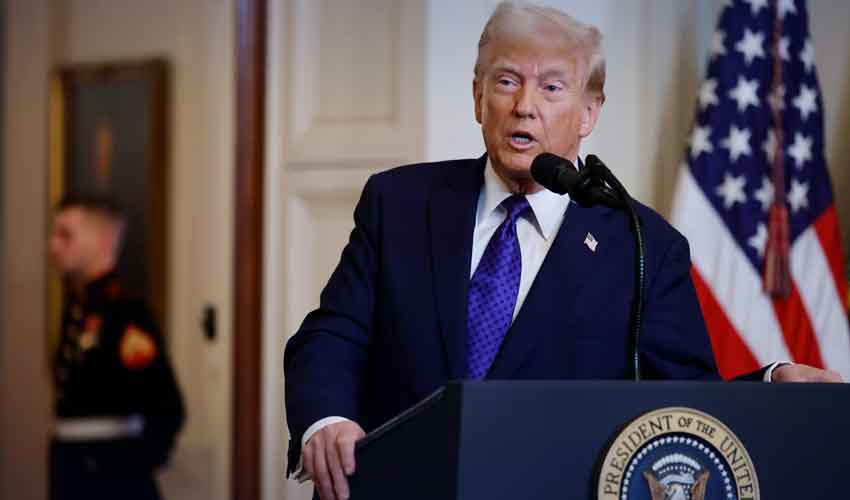US President Donald Trump has dismissed concerns over a leaked Signal group chat - where top-level government officials reportedly discussed plans for bombing Yemen.
The leak, first reported by The Atlantic, has triggered sharp criticism from Democratic senators, who termed the conversation on a non-secure platform as “reckless” and “dangerous.”
Speaking at a meeting of US ambassadors, Trump sought to downplay the controversy, saying, “There was no classified information, as I understand it. It’s just something that can happen.”
He ruled out any punitive measures, barring the use of the encrypted messaging app Signal or seeking an apology from those involved.
The controversy erupted after The Atlantic’s editor-in-chief Jeffrey Goldberg revealed he had been accidentally added to a Signal chat, where discussions on military strikes against Houthi rebels in Yemen were taking place. The chat allegedly included Vice President JD Vance, Secretary of Defense Pete Hegseth, and National Security Advisor Michael Waltz, among others.
Goldberg refrained from publishing specific military details but described the conversation as "shockingly reckless." He claimed officials debated not just timing the attacks but also whether economic benefits could be extracted from European allies in exchange for the bombings.
White House in damage control mode
The White House has categorically denied that any classified information was leaked. Press Secretary Karoline Leavitt accused The Atlantic of sensationalism, stating, "No war plans were discussed. No classified material was sent to the thread."
At a Senate Intelligence Committee hearing, CIA Director John Ratcliffe and Director of National Intelligence Tulsi Gabbard also denied the allegations. “I haven’t participated in any Signal group messaging that relates to any classified information at all,” Ratcliffe said. Gabbard, however, declined to even confirm whether she was part of the chat.
The explanation did little to pacify Democratic lawmakers, who raised concerns over national security risks posed by the incident.
Senator Mark Warner, a senior Democrat on the Intelligence Committee, condemned the officials’ conduct, stating, “If the Houthis had this information, they could reposition their defensive systems.” Senator Ron Wyden went a step further, calling for resignations, particularly of National Security Advisor Waltz and Secretary of Defense Hegseth.
Trump lashes out at The Atlantic
The controversy has reignited Trump's long-standing rivalry with The Atlantic, which previously published reports alleging he had referred to fallen US soldiers as “losers” and “suckers.”
During the meeting, Trump branded Goldberg as “a total sleaze bag” and accused The Atlantic of fabricating stories. “They’ve made up more stories. They’re just a failing magazine. The public understands that,” he remarked.
Trump also defended Waltz, who allegedly added Goldberg to the chat by mistake, calling him “a very good man.” Waltz, in turn, blamed journalists for "making big names for themselves by spreading lies about the president.”
US-European tensions resurface
Beyond the security concerns, the leaked chat has also highlighted internal divisions within the Trump administration over America’s foreign policy priorities.
One of the leaked messages, purportedly from Vice President JD Vance, underscored the economic disparities in global trade interests. “3 percent of US trade runs through the Suez [Canal]. 40 percent of European trade does. There is a real risk that the public doesn’t understand this or why it’s necessary,” he reportedly wrote.
Vance initially objected to the timing of the airstrikes, suggesting they be postponed for a month. However, he ultimately withdrew his reservations while expressing frustration over Europe’s reliance on US military actions.
The Signal chat scandal has further intensified scrutiny on the Trump administration’s national security protocols and its approach towards diplomatic and military transparency.

























